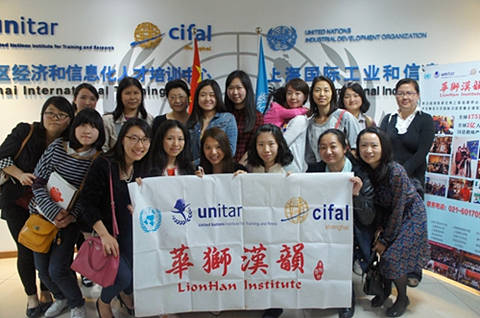汉语怎么教?上海国际学校里的中国文化传播

How
is Chinese language taught at international schools in Shanghai? Is there a
unified teaching material? Are there special cultural activities besides
regular classroom education? What qualifications are required for Chinese-language teachers?
How to choose suitable schools and teachers? It is sure that these questions
are interesting and appealing to both expats who want to learn Chinese and
Chinese who want to teach the language. An exchange meeting on Chinese-language
teaching in international schools was held on April 25, 2015 in Shanghai.
The meeting was hosted
by Lion Han Institute which is committed to the training of Chinese-language
teachers and participated by teachers who are working at famed international
schools in Shanghai, such as Wellington Shanghai, Shanghai United International
School, Dulwich College Shanghai, Ngil Kindergarten, China Europe
International, French school and British school.
Q1: About Chinese-language teaching
material and curriculum
According to the introductions by the teachers, currently the
teaching materials are mainly complied by themselves or made on the basis of
the topics given by foreign teachers. French school, a bit stricter, uses
designated materials, "What do you say" and "Easy to learn Chinese".
Each
school has its own feature on curriculum. For example, Wellinton arranges four
classes in one week and each for one hour. Both Dulwich and Ngil have five 30-minute lessons in one week. British
kindergarten has one 40-minute course every day. And five one-hour lessons are
taught in United Int'l.
Besides,
eastday.com reporter was told by Shanghai Municipal Education Commission that
at present the commission has not set standard formalities and evaluation
system to Chinese-language teaching, neither the certificate examination to
Chinese-language teachers. There are no official exchange events between the
commission and the international schools in Shanghai.
Q2: About special cultural activities
In addition to regular Chinese-language teaching in class, teachers
also undertake the task of spreading Chinese culture in international schools.
All kinds of interesting events take place in schools. For example, Dulwich College Shanghai holds not
only UN Week, Easter Day Masquerade,
Christmas performances, Book Week and concerts, but also the Year of China
events at the end of the year. At British schools, besides UK festivals and
international days, the Year of China is also celebrated and at that time
teachers and students make Dumpling or Jiaozi and watch dragon-lion dance.
Also, interest-oriented classes like calligraphy are taught on ordinary days. China Europe International School has Chinese reading class every week,
and food-making and shows on traditional Chinese holidays.
Q3: About the recruitment
requirements for Chinese-language teachers in international schools
On another hand, the teachers who work at domestic and international schools revealed that there is big difference in pay and degree of hard work between Chinese-language teachers and foreign teachers, especially in South Korean school. However, teachers have considerable days off at international schools. For example, 180 days paid vacations are provided at British school, including spring holidays, Labor Day holidays, summer vacation, and both Chinese and UK holidays.
Extended discussion
Currently, more and more foreign enterprises and foreigners enter
China and Shanghai, and Chinese-language teaching market is getting more
popular. Borrowing the words of an American trainee's father, "China is the
future". Not only students and business people, wives of expats have more
interests in learning Chinese, thus more teachers and more reasonable teaching
system are necessary.
Therefore, a lot of interesting and meaningful questions
are asked, answered and discussed on the meeting, such as, is there scientific evaluation system to the teaching quality at international
schools? Is there any focus on the preparation of the Chinese cultural lessons?
What is the difference in training concept between domestic and international
school? Is there any difference on teaching plan design between those for
international schools and foreign students in domestic universities?
About Lion Han Institute
In 2008, Lion Han Institute joined hands with East China Normal University
(the only designated "International Chinese-language teachers training base" in
East China by the Office of Chinese Language Council "Hanban") to foster Chinese-language teachers. Since
2006, the institute has trained thousands of teachers who are working across
the world. And in Shanghai, the trainees are employed in colleges,
international schools and training organizations.
Meanwhile,
Lion Han Institute persists in public activities of spreading Chinese culture.
The institute has given lessons on Chinese and Chinese culture for foreign
wives in Lujiazui International Community since 2009, winning a lot of praises.
Starting
from the beginning of 2014, Lion Han Institute became the designated
organization for civic-minded Chinese-language training to foreign-aid people
by Ministry of Commerce of China.
Moreover, the institute holds different kinds of events for the graduate trainees who are engaged in Chinese-language teaching from time to time.
By Wang Jiaye
